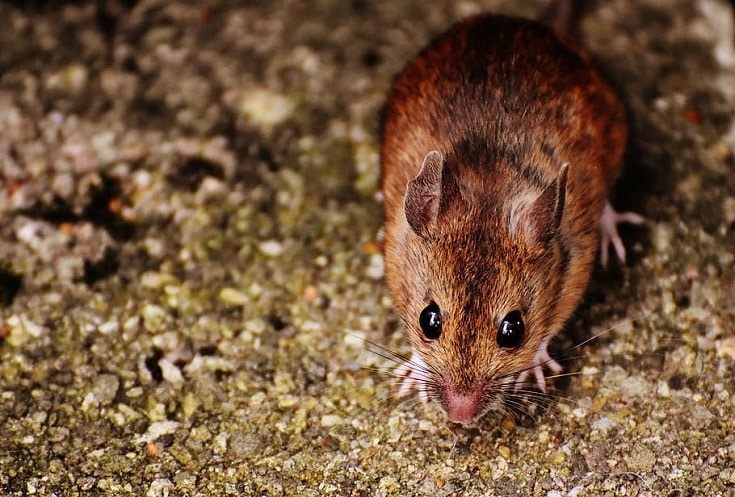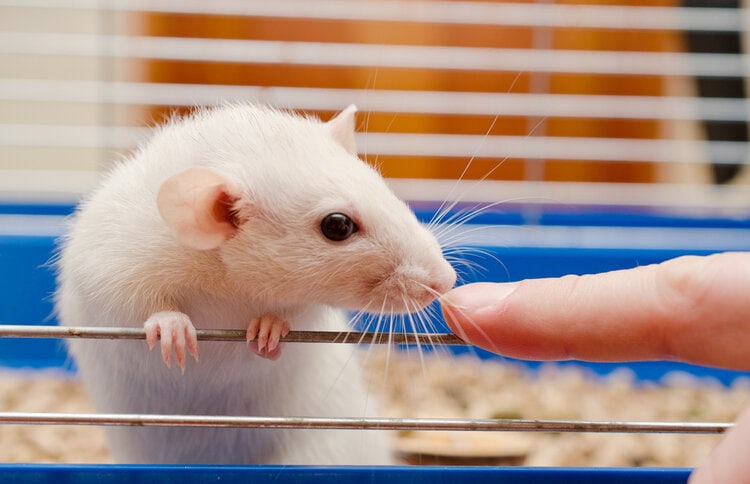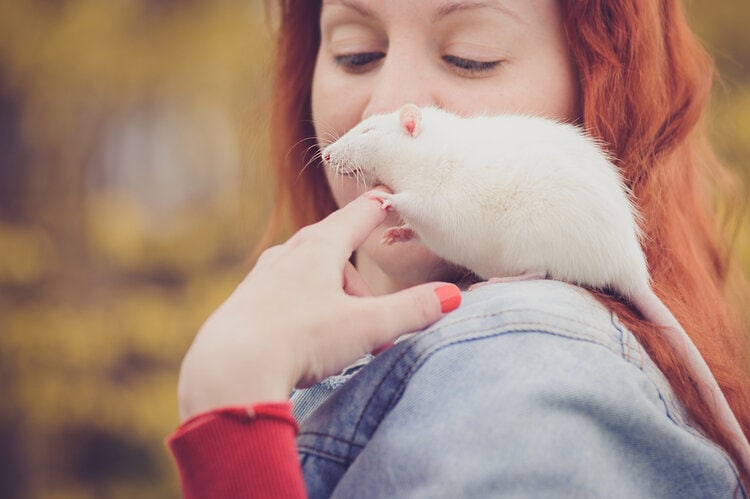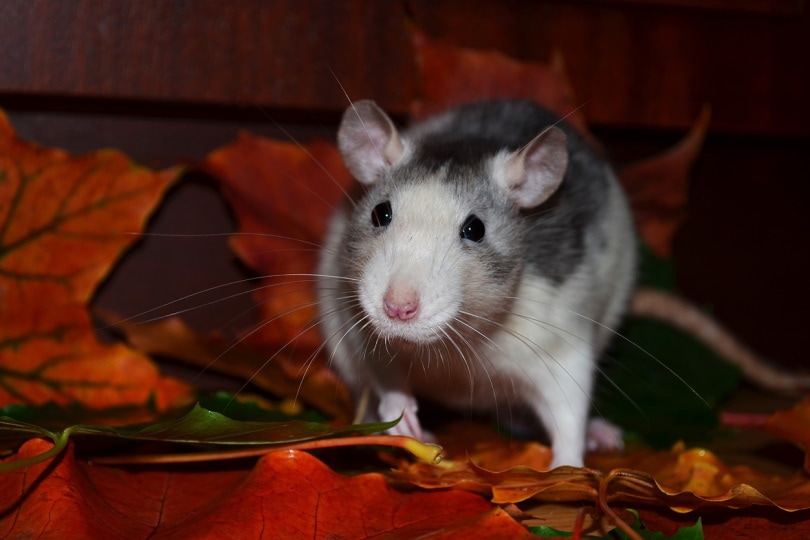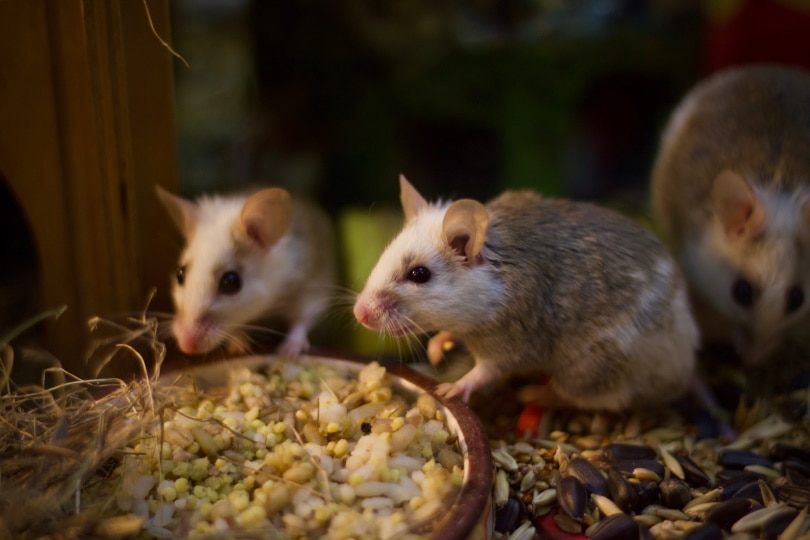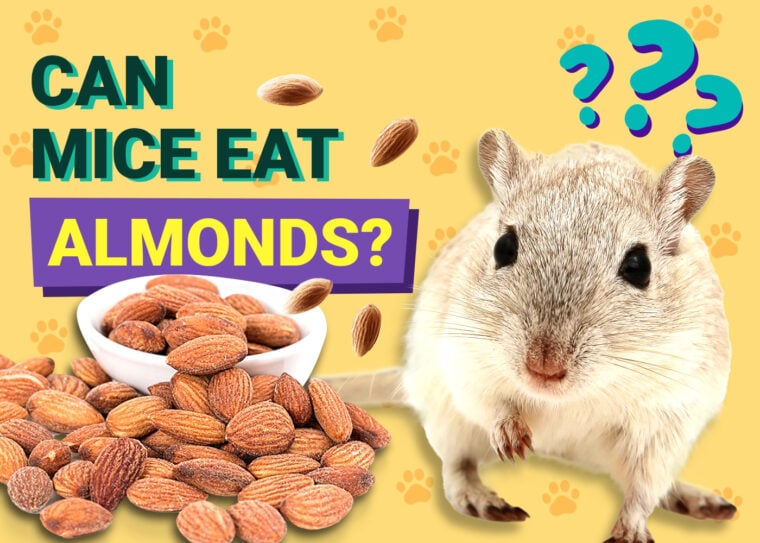
Even if your little pet mouse is omnivorous, that doesn’t mean they can eat just about anything. Being fond of bread, boiled rice, and cookies, they are also a big fan of candies, chocolate, and French fries, foods that are toxic to them because they can cause severe intestinal problems.
Most unroasted and unsalted dried fruits, such as hazelnuts, walnuts, and sunflower seeds, can be fed to your pet mice in small amounts. What about almonds? Almonds are also considered a healthy but occasional treat that you can safely feed your mice. Steer clear of bitter almonds, though!
 Can Almonds Be Poisonous to Mice?
Can Almonds Be Poisonous to Mice?
First off, there are two types of almonds: sweet or bitter.
Sweet almonds are the ones you find at your favorite store and in foods made from these nuts (like marzipan or almond milk). They are safe to eat, both by you and by your small domestic rodent. Indeed, they are rich in polyunsaturated fatty acids (omega-6), proteins, dietary fibers, as well as vitamin E and other minerals. However, due to their high-calorie content, keep an eye on your serving size: a handful of almonds consumed daily is more than enough. And in the case of the mouse, the recommended portion is even smaller: a single nut, cut into small fragments, is more than enough.
On the other hand, bitter almonds can be poisonous for both humans and mice, even in small quantities; in fact, it contains amygdalin, the molecule responsible for the bitterness and toxicity of this type of almond. Moreover, it can accumulate in bitter almonds in amounts a thousand times greater than that found in sweet almonds.
After ingestion, amygdalin is hydrolyzed to cyanide in the small intestine. Cyanide has very high acute toxicity: according to some studies, the lethal oral dose of cyanide in humans has been estimated to be approximately 0.5 to 3.5 mg/kg body weight. That corresponds to around 10 and 70 raw almonds for a 150-pound adult.
The bottom line? If bitter almonds are toxic to humans, imagine the damage they could cause to your furry little companion. So, if offering your mice a sweet almond in small quantities every now and then is safe, avoid bitter almonds at all costs. But since the Food and Drug Administration (FDA) does not allow bitter almonds to be marketed in the United States for unrestricted use, you are unlikely to stumble upon a packet of these in your local grocery store.
What Is the Best Mice Diet?
Since mice are omnivorous animals, they must eat foods from each category (protein, fat, carbs) to be healthy. So, to cover the nutritional intake of your house mouse, you can purchase mice pellets from pet stores.
Mice pellets are an ideal and practical solution. These contain mixtures of sunflower seeds, corn, wheat, and buckwheat. It is an excellent base for mice, as these seeds are rich in protein, fat, and calcium. In addition, the advantage of the pellets is that they are ingested whole. This prevents your mouse from sorting out the seeds from the mix. Indeed, these small animals also have their preferences, but not eating certain essential seeds can cause nutritional imbalance and serious deficiencies. The pellets allow them to eat everything without leaving anything out.
Also, you can give your mouse flakes if it is young. These are made from the seeds of millet, barley, corn, and oats, which means they contain much more protein. This mixture is ideal for young mice, as they need a bigger ratio of proteins. On the other hand, it is preferable to offer them sparingly to older mice.
You can supplement your mouse’s diet with small amounts of fresh, clean, dry fruits and vegetables, just two to three times a week. Mice can eat most fruits and vegetables except citrus fruits, kiwi, cabbage, avocados, and potatoes. Likewise, never give your mouse pits, as they could be fatal.
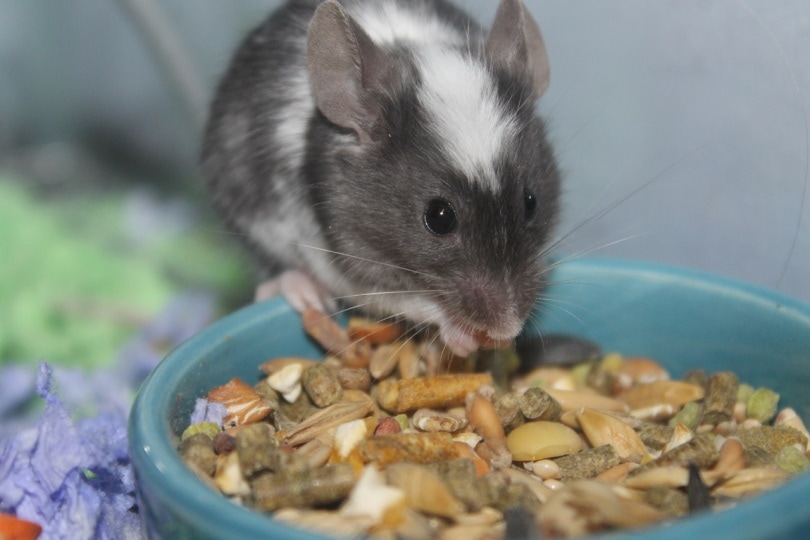
What Foods Are Toxic to Mice?
In addition to these toxic foods, others are not recommended for a variety of reasons:
What Are the Signs of Food Poisoning in Mice?
Swallowing toxic and dangerous foods can lead to serious health problems in your mouse. At best, this will only lead to food poisoning. But a poisoning that can turn to death if not caught in time.
In this case, the vital organs of your rodent will be quickly affected. Your mouse’s heart, lungs, kidneys will cease to function, resulting in inevitable death.
If your mouse is lucky, the toxic foods ingested will only temporarily interfere with its intestinal transit. Thus, your mouse may suffer from diarrhea, constipation, dizziness, lethargy, and lack of appetite. In all cases, you must take all of these signs seriously as soon as they appear and see your vet promptly.
What Treats Are Good for Your Mice?
Here’s a list of other healthy treats to give to your mice once or twice a week:
 Final Thoughts
Final Thoughts
Despite what the movie industry has us believe, mice aren’t just cheese eaters. In fact, if they have to choose between a piece of Camembert and peanuts, they will go for the nuts. And, unlike cheese, which is way too salty for them, nuts (and almonds, among others!) are a healthy treat that can be part of a pet mouse diet.
Featured Image Credit: USBFCO, Shutterstock

 Can Almonds Be Poisonous to Mice?
Can Almonds Be Poisonous to Mice?